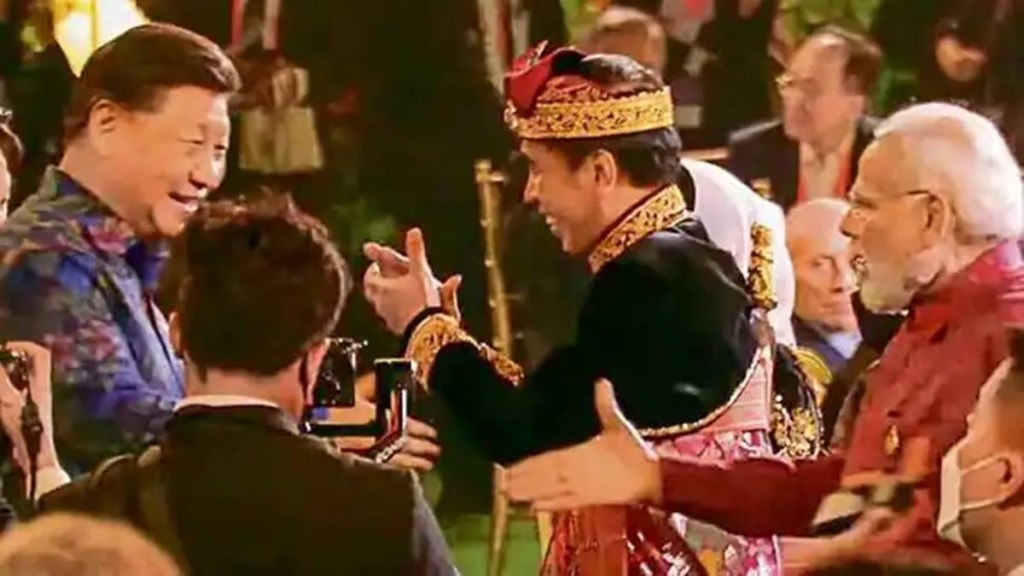During a face-to-face meeting in Bali, Indonesia, in November 2022, Prime Minister Narendra Modi and Chinese President Xi Jinping engaged in discussions aimed at “stabilising” the bilateral ties between India and China. The Ministry of External Affairs (MEA) provided clarification on this matter two days after China’s statement, which claimed that the leaders had reached an “important consensus.”
Notably, until recently, both India and Beijing remained quiet about the meeting’s details. However, after a meeting between National Security Advisor Ajit Doval and Wang Yi, China’s new Foreign Minister and Director of the Office of the Foreign Affairs Commission of the Communist Party of China Central Committee, China officially acknowledged the discussion between the leaders.
Arindam Bagchi, the Spokesperson of the Ministry of External Affairs, clarified the situation during a media briefing on Thursday (July 27, 2023), confirming that both Prime Minister Modi and President Xi Jinping exchanged pleasantries and spoke about the need to stabilize the bilateral relations during a dinner hosted by the Indonesian President.
The government has consistently asserted that resolving the situation along the Line of Actual Control (LAC) on the western sector of the India-China boundary is key to resolving the larger issue and restoring peace and tranquillity in the border areas.
In the aftermath of their meeting in November, Foreign Secretary Vinay Kwatra had mentioned the exchange of courtesies between the leaders at the G20 dinner, but the second part of their discussion was not disclosed at the time. Bagchi clarified that there was indeed a general discussion or talk about the necessity of stabilizing the bilateral relations.
The current state of India-China ties has reached an unprecedented low since the military standoff commenced in Ladakh’s eastern sector along the LAC. The Galwan River Valley area witnessed the first instance of bloodshed between the two sides since 1975, with 20 Indian soldiers losing their lives.
As the situation remains complex and sensitive, the focus remains on restoring stability in the region and finding avenues for constructive dialogue to alleviate tensions between the two nations. The Bali meeting, though previously undisclosed, carries significance in the quest for maintaining peace and harmony in the India-China relationship.
Background …
In an unexpected turn of events, the Chinese foreign ministry recently revealed that Prime Minister Narendra Modi and President Xi Jinping had reached a significant “consensus” on stabilizing India-China bilateral relations during the G20 meeting in Bali back in November 2022. The Chinese claim, which surfaced after a press briefing between National Security Advisor Ajit Doval and Chinese Political Bureau member Wang Yi on the sidelines of the BRICS NSA meet in Johannesburg, highlights the growing efforts to strengthen ties between the two Asian giants.
The meeting at the G20 summit in Bali, where the two leaders exchanged greetings, was initially perceived by New Delhi as a mere “exchange of courtesy.” However, the recent statement from the Chinese foreign ministry indicates that there was more substance to the interaction than previously acknowledged.
According to the Chinese statement, both sides reaffirmed their commitment to not posing a threat to each other and recognized each other’s development opportunities. The focus was on implementing this consensus into specific policies and actions across various departments to foster strategic mutual trust and cooperation. The ultimate goal is to steer India-China relations back to a path of healthy and stable development at the earliest.
Wang Yi, during the meeting, emphasized the rise of developing countries, including China and India, as a significant global trend. He expressed China’s willingness to collaborate with other developing nations, including India, to support multilateralism and democratize international relations. Notably, China clarified that it is not seeking hegemony like some other countries, signaling its commitment to a more cooperative and inclusive approach on the world stage.
Foreign policy expert C. Raja Mohan, while interpreting the Chinese statement, underlined the importance of tangible changes along the Line of Actual Control (LAC) to gauge any real shift in China’s position. Indeed, actions on the ground will be the true test of the proclaimed consensus.
In contrast, the Ministry of External Affairs (MEA) maintained its stance, acknowledging that strategic trust along the LAC in the Western Sector has eroded since 2020, particularly after the clashes in Galwan Valley. The MEA underscored the need to resolve the situation along the border areas fully and restore peace and tranquility. Both India and China recognized the significance of their bilateral relationship, not just for themselves but also for the broader region and the world.
Since the Galwan Valley clashes in 2020, India-China relations have been strained, prompting numerous rounds of military talks to address the situation and proposals for disengagement. Despite these efforts, tensions persist between the two nations.
The revelation of the Modi-Xi consensus offers a glimmer of hope for improved ties between India and China. However, actions must follow words, and the focus should be on practical steps to de-escalate tensions along the LAC and foster genuine cooperation.

